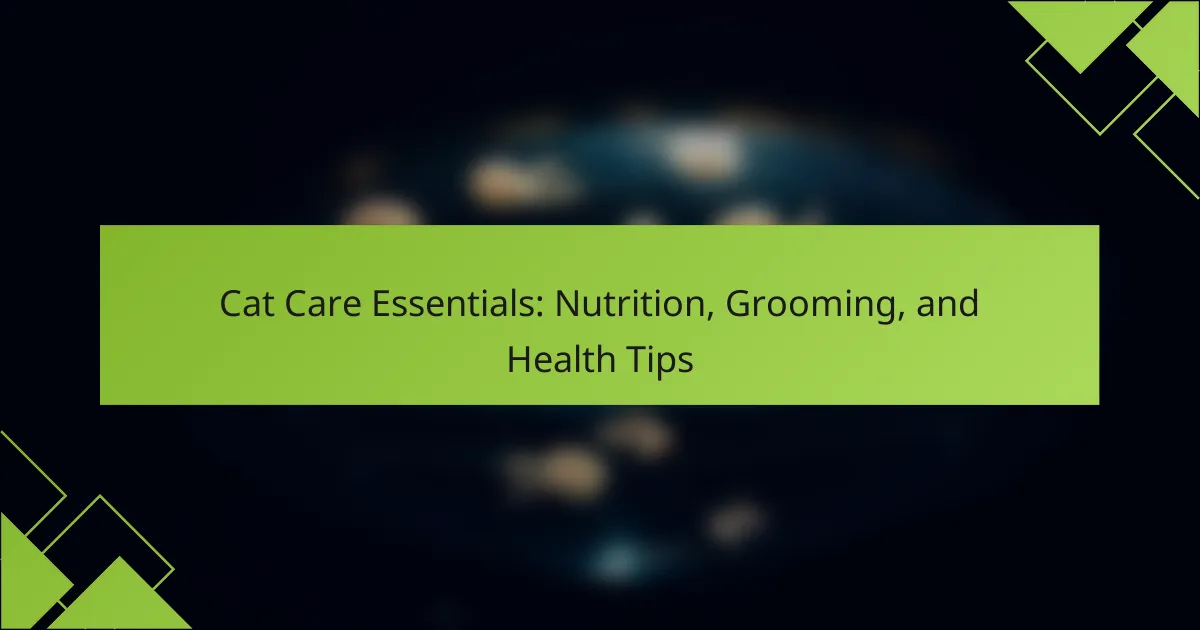Proper cat care is crucial for ensuring your feline’s health and happiness. Focus on essential nutrition, regular grooming practices, and proactive health management. Address dietary needs and common health issues, while maintaining a consistent grooming routine to enhance well-being. Understanding these fundamentals will help you provide the best care for your cat.

What are the essential nutritional needs of cats?
Cats require a balanced diet rich in proteins, fats, vitamins, and minerals. Essential nutrients include taurine, arachidonic acid, and specific vitamins like A and D. These nutrients support their overall health, energy levels, and immune function. Cats are obligate carnivores, meaning their diet must primarily consist of animal-based proteins for optimal nutrition. Regular veterinary check-ups can help ensure their dietary needs are being met effectively.
How does age affect a cat’s dietary requirements?
Age significantly influences a cat’s dietary requirements. Kittens require higher protein and fat for growth, while adult cats need balanced nutrition for maintenance. Senior cats benefit from easily digestible food and specific nutrients to support aging joints and organs.
Kittens (0-1 year) need around 30-40% protein and 20% fat. Adult cats (1-7 years) should have 25-30% protein and 15-20% fat. Senior cats (7+ years) often require lower calories but higher fiber to aid digestion. Regular veterinary consultations ensure proper dietary adjustments based on age and health status.
Which types of food provide the best nutrition for cats?
High-quality protein sources, such as meat and fish, provide the best nutrition for cats. Cats require a diet rich in animal-based proteins for optimal health.
1. Meat: Chicken, turkey, and beef are excellent protein sources.
2. Fish: Salmon and tuna offer essential omega-3 fatty acids.
3. Organ meats: Liver and kidneys provide vital nutrients.
4. Commercial cat food: Look for high meat content and minimal fillers.
5. Supplements: Consider taurine and omega fatty acids for additional health benefits.
A balanced diet ensures cats receive necessary vitamins and minerals for overall well-being.
What role do supplements play in a cat’s diet?
Supplements can enhance a cat’s diet by providing essential nutrients that may be lacking. They support overall health, improve coat condition, and boost immunity. Common supplements include omega fatty acids, probiotics, and vitamins. Always consult a veterinarian before adding supplements to ensure they meet your cat’s specific needs.
How can you identify food allergies in cats?
To identify food allergies in cats, observe symptoms like itching, gastrointestinal issues, or ear infections. Conduct an elimination diet to pinpoint specific allergens.
Monitor your cat’s reactions to various foods, and consult a veterinarian for proper testing and diagnosis. Common allergens include beef, dairy, and fish.

What grooming practices are vital for cat health?
Regular grooming is vital for cat health as it prevents matting, reduces shedding, and promotes skin health. Key grooming practices include brushing, nail trimming, and ear cleaning.
Brushing removes loose fur and dirt, which minimizes hairballs and skin issues. Aim to brush your cat at least once a week, or more frequently for long-haired breeds.
Nail trimming is essential to prevent overgrowth and potential injury. Check nails every two weeks and trim as needed.
Ear cleaning helps prevent infections. Inspect your cat’s ears weekly for dirt or wax buildup and clean gently with a vet-recommended solution.
These grooming practices enhance your cat’s well-being and strengthen your bond with them.
How often should you groom different cat breeds?
Grooming frequency varies by cat breed. Long-haired breeds like Persians need daily grooming, while short-haired breeds like American Shorthairs require grooming once a week. Regular grooming helps prevent matting and reduces shedding. Additionally, some breeds, such as Sphynx, need regular bathing due to their lack of fur.
What tools are best for grooming your cat?
The best tools for grooming your cat include brushes, combs, nail clippers, and grooming gloves. Each tool serves a specific purpose to maintain your cat’s coat and overall health.
1. Brushes: Remove loose fur and prevent mats.
2. Combs: Detangle fur and check for parasites.
3. Nail clippers: Keep nails trimmed to avoid injury.
4. Grooming gloves: Provide a gentle way to remove hair while petting.
Using the right grooming tools enhances your cat’s comfort and promotes a healthy coat. Regular grooming reduces shedding and hairballs, contributing to a cleaner home.
How can you make grooming a positive experience for your cat?
To make grooming a positive experience for your cat, start slowly and use gentle techniques. Create a calm environment by choosing a quiet space and providing treats during the process. Regular grooming helps reduce shedding and matting, which contributes to your cat’s overall health. Use the right tools, such as brushes suited to your cat’s coat type, to ensure comfort. Gradually introduce grooming sessions, allowing your cat to acclimate and feel secure.

What are common health issues in cats and how can they be prevented?
Common health issues in cats include obesity, dental disease, and urinary tract infections, which can be prevented through proper nutrition, regular veterinary check-ups, and good dental hygiene. Obesity, a prevalent issue, can be managed by providing balanced diets and encouraging exercise. Dental disease can be mitigated with routine dental care and appropriate chew toys. Regular veterinary visits can help catch urinary tract infections early, ensuring timely treatment.
Which vaccinations are essential for cats?
Core vaccinations essential for cats include rabies, feline distemper, feline herpesvirus, and calicivirus. These vaccinations protect against serious diseases and are crucial for maintaining feline health.
1. Rabies: Required by law in many areas, protects against a fatal viral disease.
2. Feline Distemper: Prevents panleukopenia, a highly contagious and deadly virus.
3. Feline Herpesvirus: Reduces the risk of respiratory infections and eye issues.
4. Calicivirus: Protects against a common respiratory virus that can cause severe illness.
Regular vaccination schedules are essential for optimal protection and should be discussed with a veterinarian.
How can regular vet check-ups improve your cat’s health?
Regular vet check-ups significantly enhance your cat’s health by ensuring early detection of potential issues. Routine examinations allow vets to monitor your cat’s overall condition, update vaccinations, and provide tailored advice on nutrition and care.
Regular visits can identify dental problems, obesity, and chronic diseases before they escalate. Cats often hide symptoms, making these check-ups crucial for maintaining their well-being. Additionally, routine blood tests can reveal underlying health conditions, allowing for timely intervention.
A study indicates that regular vet visits can extend a cat’s lifespan by up to 20%. By prioritising these check-ups, you ensure your feline companion remains healthy and happy throughout their life.
What are the signs of common feline illnesses?
Common signs of feline illnesses include changes in appetite, lethargy, vomiting, diarrhoea, and unusual behaviour. Monitoring these symptoms can help in early detection. For example, a sudden increase in drinking or urination might indicate diabetes. Regular veterinary check-ups are essential for maintaining feline health and identifying potential issues early.

What unique needs do senior cats have regarding care?
Senior cats require specialized care focusing on nutrition, health monitoring, and comfort. Their dietary needs change, necessitating high-quality, easily digestible food to support aging organs. Regular vet check-ups become crucial to detect conditions like arthritis or kidney disease early. Grooming is essential as mobility decreases, often needing assistance to maintain a healthy coat. Additionally, creating a comfortable environment with soft bedding and accessible litter boxes enhances their quality of life.
How should you adjust nutrition for older cats?
Adjust nutrition for older cats by providing high-quality, easily digestible foods. Focus on protein-rich diets to maintain muscle mass and include omega-3 fatty acids for joint health. Monitor caloric intake to prevent obesity, as older cats may be less active. Ensure hydration by offering wet food or fresh water. Regular vet check-ups will help tailor dietary needs based on health conditions.
What grooming considerations are important for senior cats?
Grooming considerations for senior cats include regular brushing, nail trimming, and monitoring for skin issues. Senior cats may have matted fur and reduced mobility, making grooming essential for comfort. Regular dental care is also crucial, as dental disease can affect overall health. Additionally, consider using gentle grooming tools to avoid skin irritation.

What are the best practices for maintaining a cat’s dental health?
Regular dental care is essential for maintaining a cat’s dental health. Brushing your cat’s teeth several times a week can help prevent plaque buildup. Providing dental treats and toys can also support oral hygiene. Regular veterinary check-ups ensure professional cleanings and early detection of dental issues. Additionally, monitoring your cat’s diet for high-quality nutrition supports overall dental health.
How often should you clean your cat’s teeth?
You should clean your cat’s teeth at least twice a week. Regular dental care prevents plaque buildup and promotes overall health. Daily brushing is ideal for optimal oral hygiene. Use cat-specific toothpaste and a soft brush for comfort. Additionally, consider dental treats and toys to support oral health.
What products are effective for cat dental care?
Effective products for cat dental care include dental treats, toothpaste, and water additives. These products help reduce plaque and tartar buildup, promoting overall oral health.
Dental treats, such as Greenies, are designed to clean teeth while cats chew. They often contain ingredients that freshen breath and support gum health.
Toothpaste specifically formulated for cats, like Vet’s Best or PetSmile, is safe for ingestion and helps remove plaque. Regular brushing can significantly improve dental hygiene.
Water additives, such as TropiClean, can be mixed into drinking water to help reduce bacteria and plaque formation. These products provide an easy way to maintain dental health without the need for direct brushing.

What are the most common mistakes cat owners make?
Common mistakes cat owners make include improper feeding, neglecting grooming, and overlooking health check-ups. Many owners often choose low-quality food, which can lead to nutritional deficiencies. Regular grooming is essential to prevent matting and hairballs, yet many skip this vital task. Additionally, failing to schedule routine veterinary visits can result in undiagnosed health issues. These mistakes can significantly impact a cat’s overall well-being.
How can you avoid overfeeding your cat?
To avoid overfeeding your cat, establish a consistent feeding schedule and measure portions accurately. Monitor your cat’s weight regularly and adjust food intake based on activity level and age. Use interactive feeding toys to slow down eating and provide mental stimulation.
What should you know about introducing new foods to your cat?
Introduce new foods to your cat gradually to avoid digestive issues. Start with small portions and observe for any adverse reactions. Monitor your cat’s weight and overall health during the transition. Choose high-quality, balanced options that meet their nutritional needs. Consult a veterinarian for tailored advice and recommendations.
Which grooming errors can lead to health issues?
Improper grooming can lead to various health issues in cats, including skin infections, matting, and dental problems. Regular grooming prevents excessive shedding and reduces hairballs. Neglecting grooming can also result in parasites like fleas and ticks. Additionally, overgrown nails can cause pain and mobility issues.
What tips can help you optimize your cat’s overall care?
To optimize your cat’s overall care, focus on balanced nutrition, regular grooming, and preventive health measures. Provide high-quality cat food that meets their dietary needs, ensuring hydration through fresh water. Groom your cat regularly to prevent matting and reduce shedding. Schedule routine veterinary check-ups for vaccinations and health assessments.
